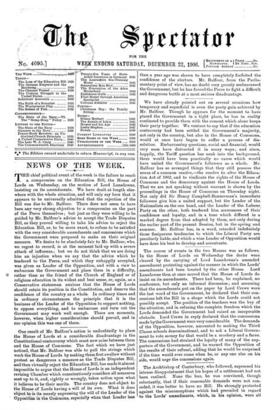The Archbishop of Canterbury, who followed, expressed his intense disappointment
that his hopes of a settlement had not been realised. None the less, he was convinced, though reluctantly, that if their reasonable demands were not con- ceded, it was better to have no Bill. He strongly protested against the misconceptions which had prevailed in regard to the' Lords' amendments, which, in his opinion, were all within the four corners of the Bill. In conclusion, he thought that something had been gained. People thought more about the. subject of education than they did, and thus he hoped, that they . were being led to a solution which would be larger and more true than the solution now before them would be if it were attained. With the remarkable speech of the Duke of Devonshire, who dis- sociated himself from the Unionist leaders, we deal elsewhere, Lord Goschen, who denied that the decision arrived at was the result of party domination, and the puke of Norfolk, speak- ing on behalf of the Roman Catholics, having supported Lord Lansdowne, Lord Ripon closed the debate with a warning to the Opposition not to expect something better for the denomina- tional schools in years to come. On a division the Motion was carried by 132 votes to 52, the Duke of Devonshire voting with the minority.







































